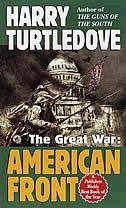
Recommended Reading
I’ll be the first to admit that I am a book snob. Mocked by all the written words I will never, in my lifetime, be able to read each time I walk into a book store or library, I must be picky. That being said, the brain is like a muscle and if you train your muscles to their max every time you go to the gym, you will become exhausted, probably injure yourself and not meet your goals. That being said, when referring to one’s brain, burn out is always a factor as you may recall back in the days of cramming for examinations.
So, every now and again, I come across something well written that may not fit into the category of academic or classic, but, is rather a well crafted story. So the other week at work a colleague recommended me a series by the Science Fiction writer, Harry Turtledove. I must say, when I hear ‘Sci-Fi’ or ‘Fantasy’ I tend to shut down with images of space folk and Hobbits running rampant with evil dragons and Smurfs on steroids (I have already confessed to my snobbery) – not my cup of tea at all. After hearing my colleague out, however, and with the assurance that all the characters were human and that there were no space ships, I ventured out to my local book shop and picked up a copy of The Great War: American Front by Harry Turtledove.
The Great War is a three book series starting off in 1914, followed by another series titled American Empire, and, though located in the Sci-Fi section, it is alternative history in nature (then again, what history isn't 'alternative'!). The early to mid 20th Century is one of my most studied epoch as I find it utterly fascinating with all the social changes, literary and political movements, etc. I’ve studied the First World War in considerable depth, as well as the Russian Revolution, Irish Uprising, etc. Many of my favourite writers: Sartre, Faulkner, Camus, etc. were writing at this time. So, needless to say the premise of The Great War was appealing.
The Great War takes place on the North American continent during the First World War. Europe is in the periphery, and the War is going on as it did in reality. The twist is that, in North America, history is altered from the one that we know, resulting in war waging on the continent. Essentially, the Confederacy won the War of Succession, resulting in a very different political map from the one we know. The Confederate States of America (CSA) and Dominion of Canada are allied with the French and British while the USA is allied with Germany and Austro-Hungary. As the War wages, Turtledove follows a number of different characters ranging from Artists, petit bourgeois, Communists, lay people and soldiers. In addition to all of this, Custer is alive and commanding troops along the Canadian border (just one of several historical characters in re-written roles), the Blacks have been freed as slaves in the CSA (but are still treated like crap in both the CSA and USA, planting the seeds of revolution) and there is a Mormon uprising in Utah.
The Great War is truly a good and easy read. I’ll probably go through the whole series, and am already lamenting its end as I’m nearly finished book one (ever get the feeling that you are losing a companion when you spend a lot of time on one novel?). Just a word of warning, Turtledove has another series titled Worldwar which is set during the Second World War where, in a brief synopsis gained from reading the back, blips are ignored on the radars of the warring forces in Europe only to be later invaded by Aliens (much like in Wells’ War of the Worlds), forcing the Axis and Allies to unite and fight back….
Happy reading!


1 Comments:
At 11:25 a.m. , Anonymous said...
Anonymous said...
Science fiction is my favorite, but I hate fantasies. If it doesn't have some good science involved, somewhat believable evolutionary work, etc., then I don't like it. My first SF book was "Childhood's End" by Arthur Clarke, and one of my faves is "The Jesus Incident" by Frank Herbert.
Post a Comment
Subscribe to Post Comments [Atom]
<< Home